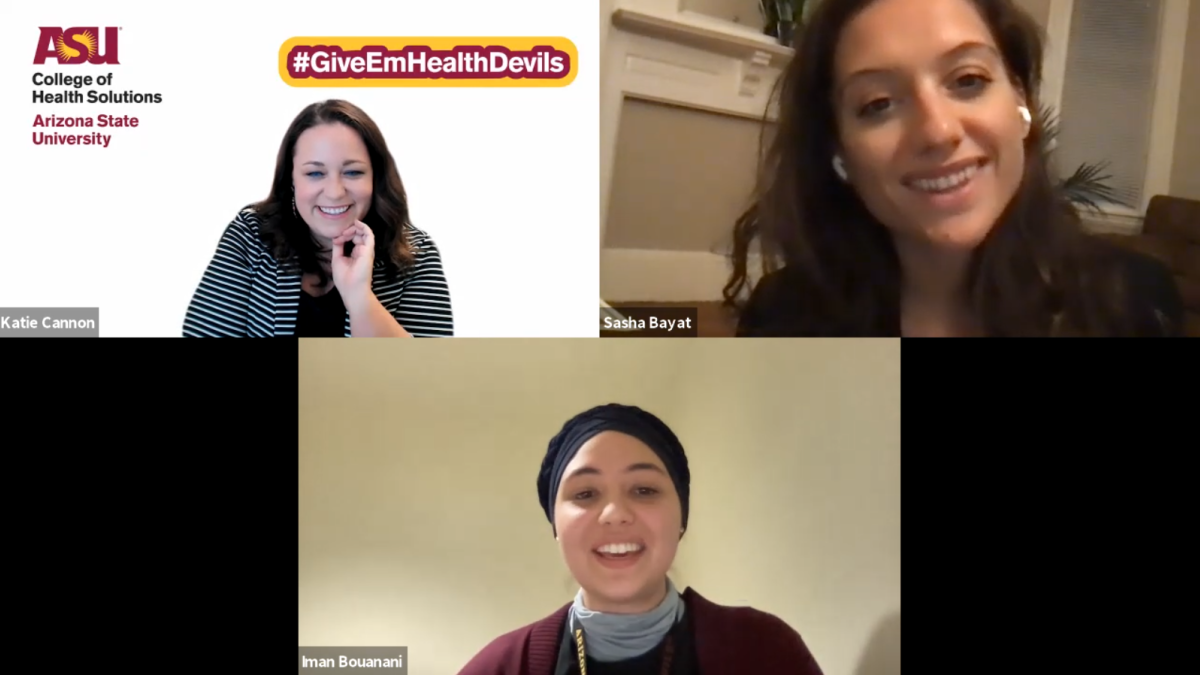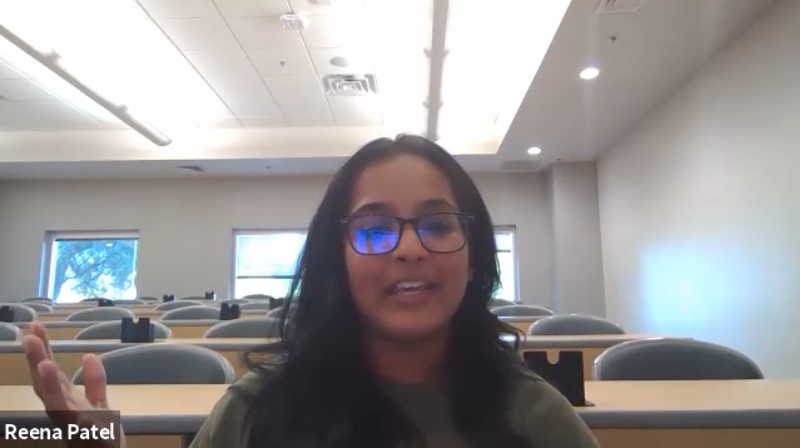Voices of experience: ASU health solutions alumni visit with undergrads to coach, connect

Health Solutions alumnae Iman Bouanani (bottom) and Sasha Bayat (top right) share their student experience with new undergraduate students as part of the CHS 101: The ASU Experience classes. College of Health Solutions alumni coordinator Katie Cannon hosts the alumni panels.
For every College of Health Solutions student who has ever wished for an older sibling on campus to help them navigate ASU, here’s the next best thing — health solutions alumni.
Alumni from a wide range of health degrees connected with current students via Zoom this semester to share their experiences and lessons learned. Panel discussions featuring health solutions alumni, piloted last year, are now a key component of CHS 101: The ASU Experience, the one-credit course first-year students take to learn about all of Arizona State University's support services that can help set them up for success.
Alumni join panel discussions during class where they answer a moderator’s questions and then field student inquiries during Q&A sessions.
“Being a resource for new students, especially freshmen, is important for me,” said Iman Bouanani, a panelist in the 2021 lineup of alumni. “I was in online school most of my life, and going from home to a school like ASU is a little daunting. I want these new students to know there are people like me who understand what they’re going through.”
While she completed her bachelor’s degree in medical studies in 2020, Bouanani is continuing on as an ASU graduate student pursuing a master’s degree in biomedical diagnostics. Ultimately, she wants to attend medical school.
“Going into a field that’s so competitive, it’s stressful and easy to get overwhelmed,” Bouanani said.
Her goal in participating on the panels was to help new students take advantage of opportunities and build an undergraduate resume that will help with graduate school applications.
Reena Patel had similar goals when she agreed to be a panelist. At ASU, she earned a Bachelor of Science in nutrition, and now she’s pursuing her doctorate in physical therapy. Both panelists had plenty of advice for the newcomers on how to get the most that ASU has to offer.
Karina Starbuck, the assistant director of student services at the College of Health Solutions who oversees the CHS 101 classes, said the alumni panels have proved to be a popular part of the course.
"The alumni really help to motivate and inspire so many of our students. We get positive feedback and reflections from our students about the advice shared during these panels. Students appreciate hearing about the path that each alumni took to get to where they are today," she said.
Rising above the crowd
Though both panelists said they were shy and introverted in high school, they left that shyness behind at ASU, and they advised the first-year students to do the same. The key, they said, is to get involved. Clubs, campus activities, jobs and even hobbies will work.
“Be your own person, and put yourself out there,” Patel told the students who attended her session. “A lot of people think grad school requires you to just be book smart. That is one part of it, but another part is being a person. You are going to be a health care professional, and that requires you to interact with other people and create a comfortable environment. It’s hard to do that without strong social skills.”
Reena Patel speaks to ASU health solutions students via Zoom.
Bouanani expanded her skills and confidence by joining the American Medical Students Association as one means of meeting like-minded individuals and getting experience in the health care field.
“They offer opportunities in terms of volunteering,” she explained.
Bouanani also started her own club, calling it Inspire Change, and focused her efforts on helping pre-med students like herself find more extracurricular learning during the height of the pandemic, when classes were mostly online. One door she opened was a chance for students to shadow doctors in telemedicine settings, thereby helping the students better understand clinical practice itself.
Like Bouanani, Patel immersed herself in student groups and activities, and also participated in research as an undergraduate, something she says helped prepare her for a physical therapy career.
“I volunteered with a professor working with adults who have Down syndrome, which taught me how to adapt quickly based on the environment,” she said.
She also studied abroad in Peru, where she learned to communicate effectively despite language barriers.
“These are key skills required to be a successful, caring health care professional,” she added.
Bouanani made sure she reached out to instructors to augment her classroom experience.
“A lot of students are afraid to go meet with their professors. They think they’re wasting the professor’s time. That’s not the case,” she said. “Any time I had a question, I’d go straight to my professors. They are there to help and guide you. Some of the best connections I have at ASU are with my professors.”
Today, as she works through her graduate program, Bouanani helps students and professors unlock learning opportunities through internships as part of her current student worker position in the College of Health Solutions’ community placements team. Soon, she’ll be working at Phoenix Children’s Hospital to get more experience.
“It’s aligned with what I want to do — one-on-one patient care,” she said.
Bouanani is passionate about helping patients gain access to health care resources and take control of their health.
“That’s the end goal — to become a doctor, to advocate for my patients and to support patient empowerment,” she said.
Patel has a similar vision. Once she completes her doctorate and is working as a physical therapist, she hopes her impact goes beyond the hours at the clinic and helps patients create a healthier lifestyle.
“For a very long time, the solution to pain or health issues was medication, and now we are moving away from that model,” she said. “I want to help individuals with pain and impairments gain relief through exercises and lifestyle changes instead of through medication. My goal is to not only treat the impairment but to treat the patient in hopes that we can set them up for success beyond their injury.”
That goal sounds a lot like the reason Patel gave for participating in the CHS 101 panel discussions.
“I wanted to give new students advice about what ASU can offer and help set them up for success,” she said.
The College of Health Solutions is always glad to hear from alumni who are willing to share their knowledge and experience, both from their days as students and as professionals in their fields. Contact CHSalumni@asu.edu to learn more about speaking opportunities, including the CHS 101 panels.
More Health and medicine

College of Health Solutions alumnus named Military Medic of the Year
By Keri Hensley and Kimberly LinnJonathan Lu has looked out for the health of his fellow military service members his whole…

ASU, Mayo Clinic forge new health innovation program
Arizona State University is on a mission to drive innovations that will help people lead healthier lives and empower health care…

Innovative, fast-moving ventures emerge from Mayo Clinic and ASU summer residency program
By Georgann YaraIn a batting cage transformed into a custom pitching lab, tricked out with the latest in sports technology,…
